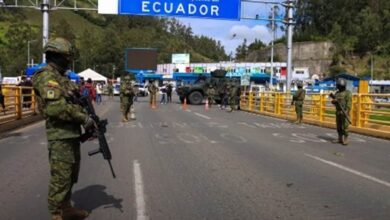National Strike and Pandemic: the Two ‘Achilles Heels’ Of Iván Duque
Recently, A Survey In Colombia Revealed That Almost 70% Of the Population Has An Unfavorable Opinion Towards Its President, Iván Duque. What Are the Reasons?.

According to a survey, in most of the country Duque reaches an unfavorable 67% after reaching his third year of presidential term on August 7. Photo: Flickr-Policia Colombia
LatiAmerican Post | Christopher Ramírez Hernández
Escucha este artículo
Leer en español: Paro nacional y pandemia: los dos ‘talones de Aquiles’ de Iván Duque
For some months, and even years, Colombia has been plunged into a political polarization in which its inhabitants live in a swing of emotions, in search of the messiah who can root out the economic, social, and cultural problems of their country. It seems that said "savior" is not its current president, Iván Duque.
According to a survey developed and published on August 13 by the market research and advisory company Invamer, in most of the country, Duque polls at an unfavorable 67% after reaching his third year as president on August 7.
It should be remembered that in August 2020, when Duque completed his second year in the Casa de Nariño (seat of government), the Invamer survey revealed an approval rate of 48.2%, against a disapproval rate of 46.6%. How was it that in just one year, the unfavorable image of Iván Duque increased by almost 22%? What are the factors that have caused more than half the country to disagree with his management as President of Colombia?
It may interest you: Interview: What is happening with the migration crisis in Antioquia?
National strike 2021
On April 28 of this year, a series of protests began against the national government, due to a controversial tax reform that, allegedly, tried to establish the Value Added Tax (VAT) on basic necessities such as eggs and milk, in addition to controversial increases in income tax. However, what began as a protest against a bill, led to an almost indefinite national strike in the main cities of Colombia.
On July 4, the Center for Memory, Peace and Reconciliation (CMPR), which focuses on reporting the history of the armed conflict in Colombia, showed a report in which they revealed some of the most shocking numbers left by the violence in the midst of the protests in the country.
Citing the NGO Temblores, between April 28 and June 26, 2021 (the climax of the national strike), at least 44 homicides were recorded resulting from 4,687 acts of violence by the Colombian Police. Likewise, the CMPR revealed that in the first two months of protests, more than 80 cases of eye violence were reported, being April 28 (the day the strike began) and May 1 (Labor Day), the two dates on which the highest number of victims was registered due to this situation: 11 and 9 people, respectively.
This atmosphere of violence, together with the generalized rejection of the national government's economic policies, led to unprecedented disapproval of the mandate of Iván Duque, with a 76% nonconformity towards his administration, according to an Invamer study.
Even sectors close to the Government expressed their dissatisfaction with Duque, since they describe him as very "soft" by letting the strike last so long. In addition to the fact that most large business groups (close to the Government) were the most affected in those two months.
Covid-19 pandemic
The covid-19 pandemic still affects Colombia considerably. It also encouraged the growth of the negative image of Iván Duque, especially due to the way in which immunization against this disease has been handled in the country.
Colombia has not managed to get out of the Top 10 countries with the highest number of infections by the new coronavirus. According to the Johns Hopkins University records, Colombia ranks ninth on the list of countries with the most cases of covid-19, with almost five million. In the region, it is only surpassed by Brazil (third in the world) with almost 20 and a half million and Argentina, which is eighth, with a little more than five million infected since the pandemic began.
Blow to Uribismo?
However, the fall in the image of Iván Duque does not affect only him, since he is the highest representative of the Democratic Center, of course, after its leader, former president Álvaro Uribe. However, despite the impact that Uribe may still have in the midst of daily political life in Colombia, Duque is the Uribista who has the highest executive position in the country, so his approval or disapproval ends up directly affecting his community. .
In this way, it is necessary to wait for what may happen in the Presidential Elections of 2022, taking into account that in the regional elections of 2019 the big losers were the traditional political parties.
So, with Iván Duque being disapproved by the majority of Colombians and with a voting intention led by the opposition Gustavo Petro (30%), there are two possible scenarios for the change of Presidency in Colombia: either the leftist Petro wins, or Uribismo learns from their mistakes and manages to place a president with more experience. Currently, the former presidential candidate in 2014, Óscar Iván Zuluaga is uribismo's most viable option.





